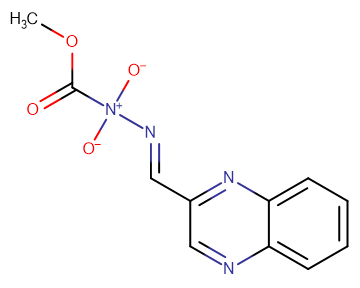
Carbadox
CAS No. 6804-07-5
Carbadox( Carbadoxum | Fortigro | Getroxel | CCRIS-3002 | CCRIS 3002 | CCRIS3002 | HSDB7028 )
Catalog No. M15595 CAS No. 6804-07-5
An antibacterial agent that has been used in veterinary practice for treating swine dysentery and enteritis and for promoting growth.
Purity : >98% (HPLC)
 COA
COA
 Datasheet
Datasheet
 HNMR
HNMR
 HPLC
HPLC
 MSDS
MSDS
 Handing Instructions
Handing Instructions
| Size | Price / USD | Stock | Quantity |
| 100MG | 38 | In Stock |


|
| 200MG | 51 | In Stock |


|
| 500MG | Get Quote | In Stock |


|
| 1G | Get Quote | In Stock |


|
Biological Information
-
Product NameCarbadox
-
NoteResearch use only, not for human use.
-
Brief DescriptionAn antibacterial agent that has been used in veterinary practice for treating swine dysentery and enteritis and for promoting growth.
-
DescriptionAn antibacterial agent that has been used in veterinary practice for treating swine dysentery and enteritis and for promoting growth. However, its use has been prohibited in the UK following reports of carcinogenicity and mutagenicity. (In Vitro):The results of MTT assay demonstrate a dose-dependent decrease in mitochondrial activity in Vero cells at all concentrations of Carbadox. Treatment with Carbadox at the highest concentration of 160 μg/mL results in cell viability down to only 12%. Cells following Carbadox treatment show a dose-dependent increase of the DNA migration (p<0.01). The nuclear division index (NDI) reduces markedly with the increase doses of Carbadox.(In Vivo):Alpha diversities (Shannon diversity, Heips evenness, and inverse Simpson indices) of samples from medicated piglets compare to non-medicated piglets are significantly different at 2, 3, and 4 days after continuous Carbadox, but not different in either late Carbadox or at any time during the withdrawal period. Analysis of the community structure of bacteria in animals shows significant differences at days 3 and 4 of early Carbadox treatment ([R=0.32, p=0.015] and [R=0.54, p=0.003], respectively), but not before starting antibiotic treatment (p=0.82). No significant differences in E. coli colony forming units (CFUs) are observed during the Carbadox-treatment period of the study or late in the withdrawal period. E. coli CFUs are significantly different between the medicated and non-medicated groups on day 2 after the withdrawal of Carbadox.
-
In VitroThe results of MTT assay demonstrate a dose-dependent decrease in mitochondrial activity in Vero cells at all concentrations of Carbadox. Treatment with Carbadox at the highest concentration of 160 μg/mL results in cell viability down to only 12%. Cells following Carbadox treatment show a dose-dependent increase of the DNA migration (p<0.01). The nuclear division index (NDI) reduces markedly with the increase doses of Carbadox.
-
In VivoAlpha diversities (Shannon diversity, Heips evenness, and inverse Simpson indices) of samples from medicated piglets compare to non-medicated piglets are significantly different at 2, 3, and 4 days after continuous Carbadox, but not different in either late Carbadox or at any time during the withdrawal period. Analysis of the community structure of bacteria in animals shows significant differences at days 3 and 4 of early Carbadox treatment ([R=0.32, p=0.015] and [R=0.54, p=0.003], respectively), but not before starting antibiotic treatment (p=0.82).No significant differences in E. coli colony forming units (CFUs) are observed during the Carbadox-treatment period of the study or late in the withdrawal period. E. coli CFUs are significantly different between the medicated and non-medicated groups on day 2 after the withdrawal of Carbadox.
-
SynonymsCarbadoxum | Fortigro | Getroxel | CCRIS-3002 | CCRIS 3002 | CCRIS3002 | HSDB7028
-
PathwayOthers
-
TargetOther Targets
-
RecptorOthers
-
Research Area——
-
Indication——
Chemical Information
-
CAS Number6804-07-5
-
Formula Weight262.22
-
Molecular FormulaC11H10N4O4
-
Purity>98% (HPLC)
-
SolubilityDMSO: 10 mM
-
SMILESO=C(OC)[N+]([O-])([O-])/N=C/C1=NC2=CC=CC=C2N=C1
-
Chemical NameCarbazic acid, 3-(2-quinoxalinylmethylene)-, methyl ester, N(sup 1),N(sup 4)-dioxide
Shipping & Storage Information
-
Storage(-20℃)
-
ShippingWith Ice Pack
-
Stability≥ 2 years
Reference
1. Bearson BL, et al. Front Microbiol. 2014 Feb 11;5:52.
molnova catalog



related products
-
Azelaprag
Azelaprag (AMG 986) is an effective small-molecule apelin receptor agonist. Azelaprag can be used to treat neurological diseases and cardiovascular diseases.
-
Isofraxidin
Isofraxidin protects leukemia cells from radiation-induced apoptosis via ROS/mitochondria pathway in a p53-independent manner.
-
Ethylenebis(oxyethyl...
Ethylene glycol?bis(2-aminoethyl)tetraacetic acid is a diether that is?ethylene glycol?in which the hydrogens of the?hydroxy?groups have been replaced by 2-[bis(carboxymethyl)amino]ethyl group respectively.



 Cart
Cart
 sales@molnova.com
sales@molnova.com


